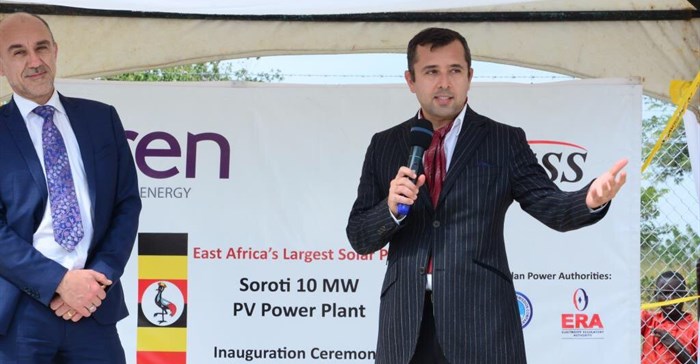When power goes out in the rural town of Soroti in eastern Uganda, store manager Hussein Samsudin can only hope it won't go on so long it spoils his fresh goods.

Source: Eren Renewable Energy
Another shop owner, Richard Otekat, has to pay a neighbour hourly to use his generator during blackouts as he can't afford to buy one himself, while others simply go without.
However residents of the town, surrounded by thatched huts, rivers and grasslands, hope a new solar plant will bring an end to their electricity woes.
Seeking new energy sources
The $19m, 33-acre solar plant -- the first of its kind in East Africa -- can produce 10MW of power that is fed into Uganda's national power grid.
The project is crucial as Uganda seeks new ways to bring electricity to the 80% of its 40 million-strong population that does not have access to power.
"We are an agricultural economy, the majority live in rural areas," said Ziria Tibalwa Waako, acting head of the national electricity regulator, Uganda Electricity Regulatory Authority (ERA).
She said the main source of energy available to most Ugandans is firewood, while others use charcoal and gas, as electricity is just too expensive at around 15 US cents a unit.
It is hoped the introduction of power from the solar plant into the national electricity grid -- fed by hydro power and independently run diesel generators -- will bring the price down.
"Power is costly. It eats into our profit margin," Otekat said.
"Unfortunately when power is not there for like six hours that is an automatic loss we are expecting," said fellow shop manager Samsudin, tired of melting ice-cream and meat going off.
Where the sun is brighter
"The plant will provide clean, low-carbon, sustainable electricity to 40,000 homes, schools and businesses in the area," said Christophe Fleurence, vice president of Eren Renewable Energy, one of two private companies operating the plant, funded by EU partners.
He said that Soroti, some 300km from Kampala, was "where the sun is brighter than anywhere in Uganda."
Uganda has one of the lowest electrification rates in Africa, according to Climatescope, the clean energy country competitiveness index.
While the solar plant could ensure businessmen like Samsudin and Otekat have a more steady power supply, those who aren't yet connected to the national grid or cannot afford electricity at all, are unlikely to benefit soon.
And the wait for electricity can prove dangerous.
"People use firewood to light their houses because kerosene is very expensive to some households. We had cases of people's homes burnt especially as they slept or when left unattended to," said local official Edward Esegu.
Cheapest form of new electricity
Many African nations, and developing nations elsewhere in the world, are taking the lead in renewable energies by turning to solar as a first step in their power arsenal.
Climatescope said that clean energy investment had doubled from 2014 to 2015 to reach $5,2bn in the 58 emerging markets it surveys.
And Bloomberg New Energy Finance released data last week showing that solar had surpassed wind in becoming the cheapest form of new electricity.
Aside from Uganda, Senegal, Mauritania, Rwanda and Kenya are among the sub-Saharan African nations investing in large-scale solar projects.
Kenya is building a 55MW solar plant and Rwanda is working on an 8,5MW solar plant.
Investing in mini grids
Meanwhile, consumers who don't want to wait for the government to provide them with energy often buy small solar panels to power their own homes and businesses.
"People walked two or more kilometres to charge phones at a fee but slowly some have bought smaller solar panels," said Esegu.
While Uganda is hoping to triple its generation capacity in the next three years, switching on two other solar plants, Waako said it is smaller, mini-grids that are more affordable to power up the most far-flung villages.
"We recognise that the extension of the grid to the rural poor is not financially viable because of the sparse nature of our population," she said.
Robert Otala, 50, gave up some of his land for the solar plant, and now lives 300 metres from the shiny panels soaking up the sun.
"It is good. It has come to develop the area," he said.
However he is one of several who will be unable to access the power from the plant, as he is not connected to the national electricity grid.




































